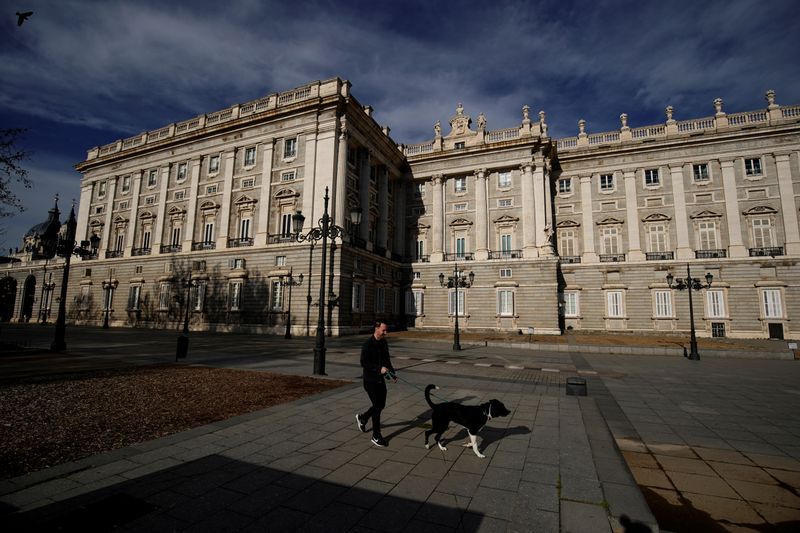Spain’s coronavirus death toll rises by 674 but pace keeps slowing
 Coronavirus disease (COVID-19) outbreak, in Madrid. REUTERS
Coronavirus disease (COVID-19) outbreak, in Madrid. REUTERSThe rate of new coronavirus infections and deaths in Spain slowed again on Sunday as the country, suffering from one of the world’s worst outbreaks of the pandemic, began its fourth week under a near-total lockdown.
Deaths from the highly infectious COVID-19 respiratory disease rose to 12,418 on Saturday – the second highest worldwide after Italy. However, the toll of 674 people who died during the past 24 hours was down from Saturday’s 809 and well below Thursday’s daily record of 950, the Health Ministry said.
Sunday’s rise represented a 6% increase in total deaths, about half the rate reported a week ago.
The total number of registered infections rose to 130,759 from Saturday’s 124,736.
“The data from this week and today confirms the slowing down of infections,” Health Minister Salvador Illa told a news conference. “The data confirms that confinement is working.”
He said one million testing kits were to arrive in Spain on Sunday and Monday and would act as “rapid screening” in places such as hospitals and nursing homes, part of an effort to pinpoint the true extent of the COVID-19 pandemic.
Defence Minister Margarita Robles told reporters: “This data is encouraging and hopeful”.
The World Health Organization’s director for Europe, Hans Kluge, tweeted about Spain: “Careful optimism as result of bold measures, innovative approaches & courageous decisions”.
Government ministers cautioned it was too early to say when Spain could start lifting its lockdown on public life.
PRE-EASTER LOCKDOWN
On Palm Sunday, a week before Easter, churches stood silent and empty in the capital Madrid, while streets that are usually packed with the stalls of the Rastro flea market were deserted.
Prime Minister Pedro Sanchez, in a televised address to the nation on Saturday, announced an extension of the state of emergency lockdown until April 26 to help tackle the emergency.
He said while lockdown measures would probably last longer than the next 15 days, some economic restrictions, such as keeping all non-essential workers at home, would be lifted after Easter. But shops, bars and restaurants will remain closed.
“We are facing the most serious crisis of our recent history and we must rise to the challenge,” Transport Minister Jose Luis Abalos told a separate news conference.
“The government will have a greater role to play in the economy. This is not just the policy of this (socialist) government but has been championed by liberal editorials.”
Business groups CEOE and CEPYME warned that while the lockdown extension “will serve to accelerate the exit from the current health crisis” it could “deepen the economic recession in which many sectors and companies…are already mired”.
They called for the government to extend aid for companies to 50 billion euros ($54.04 billion) from 20 billion and suspend taxes for particularly badly hit sectors.
Economy Minister Nadia Calvino rejected the idea in an interview with El Pais on Sunday. Asked when Spain would get back to normal, Calvino said, “We cannot return to normal from 0 to 100 in one day. We must guarantee security.”
In an article published in a series of European newspapers on Sunday, Sanchez appealed for unity among the 27 European Union countries to combat the coronavirus outbreak.
“Solidarity is a key principle of the EU treaties. And it is shown at times like this. Without solidarity there can be no cohesion, without cohesion there will be disaffection and the credibility of the European project will be severely damaged.”
There have been complaints in Spain and Italy about a perceived slowness among less hard-hit EU member states to provide assistance in curbing the pandemic.
SOURCE: REUTERS











